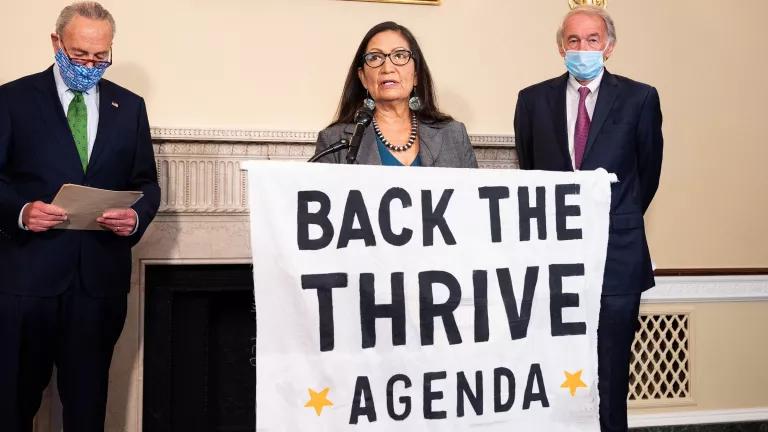Deb Haaland Is the Interior Secretary Our Country Needs
The fact that senators tied to the fossil fuel industry are opposing her nomination is a big clue as to why.

U.S. Representative Deb Haaland speaks at a press conference to present a "clean, just economic recovery plan.”
First, an assurance: It’s likely that U.S. Representative Deb Haaland will be the next secretary of the U.S. Department of the Interior. Though she faces some degree of opposition, most experts are predicting that she’ll ultimately have enough votes in the U.S. Senate to cross the threshold for confirmation.
That said, a handful of senators will undoubtedly use Haaland’s confirmation hearing on Tuesday as an opportunity to renew their marriage vows to the oil and gas industry. They will publicly—and performatively—object to her nomination on the grounds that she would end the Trump administration’s policy of letting fossil fuel companies drill on practically any parcel of federally managed land or offshore site that catches their eye.
To which the only appropriate response is: We should be so lucky.
Between her stellar record on climate and conservation issues, her demonstrated understanding of public policy, and her lived experience as a member of New Mexico’s Laguna Pueblo tribe, Haaland is an exceptional choice for the job. President Biden certainly sees her as instrumental to his promise to prohibit new leases of public lands and waters to oil and gas developers. On his first full day in office, Biden issued an executive order pausing fossil fuel development in these areas for two months; if and when a permanent moratorium becomes law, its enforcement would fall to the secretary of the Interior. Make no mistake: For those senators who oppose Haaland’s nomination, the extraction issue is at the heart of their objection. Unable to prevent a new president from fulfilling his pledge to protect our national parks, forests, monuments, and wildlife refuges, these politicians are lashing out at his choice for the Interior Department.
Haaland’s opponents have attempted to frame her as “radical.” But there’s a flaw in that strategy: There’s nothing extraordinary about her position against expanding drilling on federal lands and waters. In fact, a Washington Post–Kaiser Family Foundation poll from October 2019 found that the overwhelming majority of Americans—8 out of 10—believe that drilling for oil and natural gas within public lands and offshore waters should either decrease or remain at current levels; fewer than 15 percent of Americans, the poll showed, believe such activity should increase. Another poll last spring, this one by the Pew Research Center, found that 79 percent of U.S. adults believe the country’s top energy priority should be the development of alternative energy sources, such as wind and solar. Only one in five adults polled named expanding oil and gas production as a priority.
It’s not surprising that senators from pro-drilling states—most notably Montana’s Steve Daines and Wyoming’s John Barrasso—are opposing Haaland’s confirmation. What is surprising, though, is how unaware they are (or are pretending to be) that Biden and Haaland, like the 85 percent of Americans who want to see an end to new leases, indisputably represent the mainstream opinion on the topic.
It’s possible these senators would use a word like radical to describe another nominee with these same mainstream positions. But it’s worth noting the frequency and confidence with which they bandy about the word in labeling the first Native American nominated to run the Department of the Interior.
Haaland refers to herself as “a 35th-generation New Mexican,” and as such, she would bring a valuable perspective to Biden’s cabinet—and one that is sorely needed. The historical significance of a Native American running the Interior Department, an agency that has been openly and unapologetically hostile to Native Americans from its founding in 1849 to the present day, can’t be overstated. During its 172 years of existence, the department has codified and implemented the theft of Indigenous land and the erasure of Indigenous cultures on behalf of the U.S. government. Most recently, the department oversaw the Trump administration’s shrinking of 85 percent of Bears Ears National Monument in southern Utah—land that is supposed to be comanaged by the federal government and five local tribes, and land that is not only worthy of historic preservation but also essential to ongoing cultural practices.
As our next secretary of the Interior, Deb Haaland would support and enforce policies that help protect present-day public lands and waters and safeguard us from catastrophic climate change—and she would do it all while ensuring that those who have successfully stewarded these landscapes for many thousands of years continue to have a say in their future. Haaland may not be unanimously approved by the Senate in this week’s confirmation hearings, but she should be.
This NRDC.org story is available for online republication by news media outlets or nonprofits under these conditions: The writer(s) must be credited with a byline; you must note prominently that the story was originally published by NRDC.org and link to the original; the story cannot be edited (beyond simple things such as grammar); you can’t resell the story in any form or grant republishing rights to other outlets; you can’t republish our material wholesale or automatically—you need to select stories individually; you can’t republish the photos or graphics on our site without specific permission; you should drop us a note to let us know when you’ve used one of our stories.

Five Indigenous Poets Explore Loss and Love of their Native Lands
The Future Has Spoken: It’s Time to Shut Down DAPL and Stop Line 3
In Oklahoma, “Yet Another Broken Promise” to Native Americans